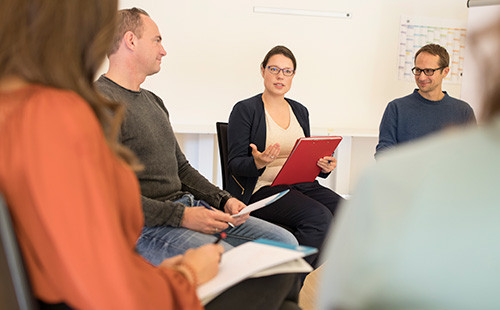André Martinuzzi

WU Vienna Andre Martinuzzi…
Teaching sustainability – Laugh and learn
Humor is a very effective tool in communication and management. It creates a positive atmosphere and establishes a trusting relationship between the people involved. But does humor also have a place in university teaching, which often deals with serious and challenging topics? What happens when students write comedy scripts instead of seminar papers? What are the effects on their academic performance? Professor André Martinuzzi, head of the WU Institute for Managing Sustainability, uses humor as a method of experiential learning and has investigated its effects.
Teachers use humor in many different ways in educational settings: They spice up their lectures with witty examples or make teaching materials more attractive by adding cartoons or memes. Beyond that, however, there is still a lot of unused potential when it comes to humor as a didactic tool.
Humor as a method of experiential learning
For five years, a team from the WU Institute for Managing Sustainability, led by Professor André Martinuzzi, has been using humor as a method of experiential learning. They have asked students to create comedy scripts on a wide variety of topics, scientifically investigated the effects achieved, and created a toolbox for use in management and sustainability education. They also collaborated with the American Improv Theater in Vienna and Markus Hennig, the multi-award-winning lead gag writer for ZDF’s “Magazin Royal.”
A flexible toolbox for many applications
Professor Martinuzzi and his team have created a toolbox for using humor in economic sustainability education, which is suitable for a wide variety of applications – from an entire master’s course to a four-hour block in a WU bachelor’s program. The method draws on approaches used by comedy schools and provides students with an understanding of the fundamentals of humor. Students acquire the skills needed to develop their own humorous writing, and they learn to produce high-quality comedy scripts. The toolbox was presented at the Academy of Management Annual Meeting in the US and received a “Best of Austria” teaching award. To date, more than 500 WU students have worked with this method.
The positive effects of humor
Humor strengthens trust and the connection between teachers and students, creates a positive learning atmosphere, reduces stress, helps to develop an optimistic attitude, and lets teachers come across as more competent and credible. All of this results in better learning outcomes and greater academic success. When it comes to sustainability in business and economics, however, humor has even more far-reaching effects. A scientific study carried out to investigate the effects of this approach has shown that using humor as a method of experiential learning promotes critical thinking and creativity, makes it easier for students to deal with emotionally difficult issues, improves their communication skills, and helps them become agents of change.
Related links:
The article
Spörk, A.; Martinuzzi, A., Findler, F., Vogel-Pöschl, H. (2022): When students write comedy scripts: humor as an experiential learning method in environmental education, in: Environmental Education Research, Volume 29, Issue 4, pp. 552-568
https://www.tandfonline.com/doi/pdf/10.1080/13504622.2022.2136626
WU Institute for Managing Sustainability
www.sustainability.eu
Teaching Humor
www.teaching-humor.eu
LinkedIn Andre Martinuzzi
https://www.linkedin.com/in/andre-martinuzzi-92741a49/
About André Martinuzzi
![[Translate to English:] Andre Martinuzzi](/fileadmin/wu/_processed_/7/7/csm_Andre_Martinuzzi_qL_b636e2f47e.jpg)
André Martinuzzi is the founder and head of the WU Institute for Managing Sustainability and an associate professor at WU. For more than 25 years, he has coordinated international research projects on behalf of the European Union, Eurostat, UN organizations, and national ministries. In the last few years, he has coordinated EU-funded projects on sustainable innovation (www.INNOVATION-COMPASS.eu, focusing on high-tech SMEs and start-ups, and www.LIVING-INNOVATION.net, involving major ICT corporations) and on responsible supply chains (www.RE-SOURCING.eu, providing a multi-stakeholder platform for the responsible sourcing of raw materials, and www.sumexproject.eu, establishing a sustainability management network in the extractive industries). He started applying experiential learning methods in his courses in the 1990s and has twice won the “Best of Austria” award for sustainability education. Professor Martinuzzi has developed a toolbox for using humor in management and sustainability education at the undergraduate and graduate levels, and he has carried out research to assess the effectiveness of this approach.
